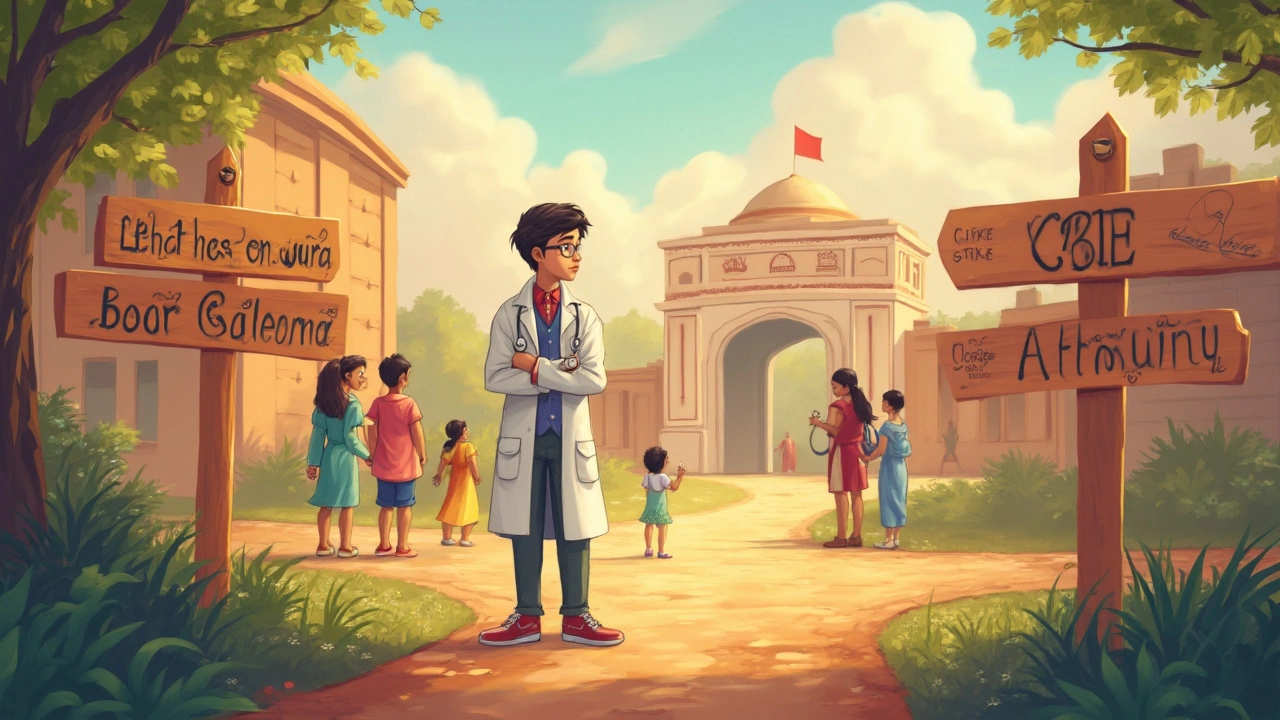If you want to be a doctor, the board you pick in school can feel like a huge decision. Everybody talks about CBSE, NEET, and which syllabus lines up better with medical entrance exams. It's not just about textbooks. It's about how well your classes actually prepare you to compete for a seat in medical college, especially when thousands of students are aiming for the same dream.
Here’s a straight-up fact: NEET, the exam every medical hopeful takes in India, uses the CBSE syllabus as its foundation. So, students from CBSE schools usually get a head start, because what they learn in class matches the topics asked on the exam. But does that mean State Boards don’t stand a chance? Not exactly. Plenty of top rankers come from State Boards too, though their journey sometimes looks a bit different.
Before stressing about which board gets someone into medical college, it helps to see how each board’s approach might help or trip you up when those exams come around. The details matter, and knowing them gives you an edge before you even start preparing for NEET.
- Why Board Matters for Future Doctors
- CBSE Syllabus: How It Fits NEET
- State Boards: Strengths and Struggles
- Essential Exam Strategies
- Tips for Choosing the Right Board
- Stories and Takeaways from Medical Students
Why Board Matters for Future Doctors
Picking the right board in high school isn't just about showing off a mark sheet. When you’re aiming to become a doctor, the board you choose—whether it’s CBSE or a State Board—sets the tone for how well you’ll cope with medical entrance tests like NEET.
First off, NEET is based almost entirely on the CBSE syllabus. So every chapter, every topic, every line from standard books like NCERT is directly useful when solving those tricky questions in NEET. That’s a huge perk for students in CBSE schools. They get familiar with the language, question style, and even the types of diagrams used, right from their textbooks.
With most State Boards, the syllabus often overlaps but isn’t an exact match. Sometimes, topics appear in different classes, or they just aren’t as detailed as what CBSE offers. This can mean extra catching up or outside coaching to fill in the gaps. For example, topics like Human Physiology or Genetics in CBSE might have 8–10 chapters, while some State Boards break these up or skip details. This difference matters when those exact questions show up in NEET.
Here’s a quick look at how board choice lines up with getting into medical college:
| Board | Direct Match With NEET | Extra Preparation Needed |
|---|---|---|
| CBSE | Almost 100% | Less |
| State Boards | 75-85% | More |
Don't forget, State Boards often focus more on state quotas, and they may include local language papers or regional topics not seen in NEET. This is good if you plan to target state-level medical seats, but not as handy for national-level exams. If your main aim is clearing NEET and getting into an MBBS program anywhere in India, starting with CBSE gives you one less thing to worry about.
So, the board you pick isn’t just about your comfort zone—it actually decides how much extra grind you’ll need before sitting for that all-important entrance exam. Smart board selection means a smoother path to your dream job in a white coat.
CBSE Syllabus: How It Fits NEET
If you're aiming for NEET, you keep hearing one thing—CBSE is the board you want to be in. Here's why. NEET's question papers are built directly from the CBSE Class 11 and 12 syllabus. That means the chapters you study for your board exams are the same ones NEET will test you on, from biology basics to those tricky chemistry reagents. No jumping around across extra topics or missing out on something crucial.
Let's look at the overlap. Most CBSE biology chapters—like Human Physiology and Genetics—show up almost word-for-word in NEET. Physics and chemistry also line up closely. If you go by the official NEET info, 90-95% of the questions stick to the CBSE curriculum. That’s why coaching centers all over India design their medical entrance crash courses around the CBSE material.
Check out this simple comparison:
| Subject | CBSE Focus in NEET (%) |
|---|---|
| Biology | Over 96% |
| Physics | About 91% |
| Chemistry | Roughly 93% |
What helps even more? CBSE's way of teaching. Their textbooks explain things clearly, with the kind of diagrams, flowcharts, and detailed examples NEET loves to use. If you’ve ever met students from other boards scrambling to get the NCERT books, this is exactly why—they realize too late that NEET expects CBSE-type answers and depth.
Here's why CBSE is often the top pick for future doctors:
- It avoids unnecessary local topics and sticks to the national standard (what NEET follows).
- NCERT books from CBSE are the official reference for NEET as mentioned by the NTA.
- Preliminary and board exams under CBSE use the same MCQ and analytical styles you'll see on NEET.
If you already know medicine is your dream, choosing the CBSE syllabus makes NEET prep much less stressful. You won’t waste time switching gears later or filling in unexpected gaps.
State Boards: Strengths and Struggles
People often think State Boards don’t match up to CBSE when it comes to medical entrance prep, but honestly, it’s not a simple black-and-white situation. Each State Board has a different style, set of books, and exam approach—so things can change a lot depending on where you study.
Let’s start with the upside. State Boards sometimes make learning more affordable and convenient. Their textbooks usually come at lower prices compared to national boards, and the syllabus can feel less rushed, giving students more breathing room to actually grasp concepts. Plus, a lot of State Board schools teach in the local language, which can be a huge win for comfort and confidence if English isn’t your first pick.
But here’s where the struggle kicks in for anyone dreaming of becoming a doctor. NEET is set by CBSE, so the questions in the entrance test follow the CBSE pattern and topics word for word. Many State Boards leave out chapters or concepts that turn up on the NEET question paper. Students from these boards often have to put in extra hours, using CBSE books like NCERT, just to level the playing field. It can feel like double work: keeping up with State Board subjects while self-studying another set from CBSE just in case.
Here’s a quick example of how some topics differ between boards:
| Subject | CBSE (NCERT) Example Topics | Common Gaps in State Boards |
|---|---|---|
| Biology | Human Physiology, Genetics | Detailed Genetics, Ecology specifics |
| Chemistry | Organic Chemistry chapters (NCERT-style) | Some reaction mechanisms skipped |
| Physics | Modern Physics | Fewer numericals, less depth |
Another thing—State Board exam patterns usually focus on memorization and writing long answers. But medical entrance exams like NEET want quick, clear, objective answers. This means State Board students sometimes need to un-learn their way of answering and get used to cracking multiple-choice questions fast.
- If you’re in a State Board and set on NEET, start referring to NCERT early. It’ll feel like reading an extra book, but it will help you big time.
- Don’t ignore English-medium practice papers. They’ll make the CBSE style less intimidating.
- Use your State Board’s strengths—your basics are strong, and you’re often better at writing detailed answers—use this for school marks, but switch gears for entrance questions.
Long story short, State Boards aren’t a dead end for becoming a doctor. They just take a little extra planning and hustle to line up with the CBSE style NEET loves.

Essential Exam Strategies
If your eyes are set on becoming a doctor, you can't just rely on what you learn in class. Crack NEET and you’re almost there, but the way you prepare matters. Here’s what students aiming for medical seats do to boost their chances:
- CBSE textbooks should be your Bible. NEET questions rarely go outside NCERT (CBSE) material, especially in Biology, Chemistry, and Physics. This isn’t a rumor—almost 85% of recent NEET biology questions came straight from NCERT lines. Memorize diagrams, solve every example, and don’t gloss over summary boxes.
- Practice mock tests regularly. Don’t just sit with your books—put yourself in exam conditions every week. Set a timer. Stick to NEET’s three-hour limit. Review mistakes right after the test. Repeat. Students who do at least two full mocks a week for three months see big jumps in accuracy and speed.
- Don’t skip revision. Make a habit of revisiting key chapters. Short notes and flashcards make revision 100x easier in the frantic weeks before the exam.
- Break complex problems down. In Physics and Chemistry, questions are often set up like tiny puzzles. If you’re from a State Board, focus extra on numericals and formulas—CBSE covers these in more depth, so you might have to level up.
Here’s a quick look at how students divide their prep time across subjects (survey of NEET toppers in 2024):
| Subject | Average Daily Study Time (hours) |
|---|---|
| Biology | 4 |
| Chemistry | 2 |
| Physics | 2 |
Notice Biology eats up the most time—NEET gives it the most questions, so smart students double down here. But you can't afford to completely neglect anything. Even one tough Physics question can be the difference between a government seat and a long wait for next year.
One more tip: surround yourself with NEET prep communities—online forums, study groups, Telegram channels. The best advice and updates often come from peers grinding with you, not just tuition teachers. You’ll pick up strategy tweaks, last minute tips, and motivation to keep going.
Tips for Choosing the Right Board
Picking between CBSE and State Boards can seriously change your prep game for becoming a doctor, especially if you’re eyeing the NEET exam. Don’t let the buzz around you make the choice for you—look at what really matters for medical entrance.
- Check syllabus overlap with NEET: CBSE textbooks cover almost all NEET topics straight out of the box. State Boards can be hit-or-miss—some have less detail or skip topics NEET expects. If you want less running around finding extra material, CBSE has the edge.
- Weigh school support: Ask your school how serious they are about medical entrance prep. Some schools have coaching integrated right into the schedule, while others leave you on your own for tough concepts. Good support means less stress later.
- Be honest about your strengths: Are you somebody who likes clear exam patterns, or do you do well when teachers give lots of notes and practice papers? CBSE tends to have a more standardized approach, which can be helpful for national exams, but some students prefer the comfort of local language and familiar-style tests in State Boards.
- Find out about past results: Don’t just rely on ads—talk to recent batches. Ask seniors about their journey. How many made it into government medical colleges? Did they have to join an outside coaching center, or was school teaching enough?
- Check flexibility for moving cities: CBSE makes it easier to shift schools if your family moves around, since the syllabus is the same everywhere. State Boards stick to their own rules and books, which can cause a headache if you need to change cities mid-year.
| Board | NEET Syllabus Match | Medium of Instruction | Mobility |
|---|---|---|---|
| CBSE | High (About 95%) | Mostly English, some Hindi | Very Easy |
| State Board | Varies (60%-85%) | Local languages & English | Harder |
If you’re set on becoming a doctor, CBSE usually lines you up closer to the finish line for NEET. But there’s no one-size-fits-all—if you thrive in your State Board and have access to extra coaching or are strong at self-study, you can catch up. Make sure you know exactly what the demands are for your dream, and back yourself up with the right resources early.
Stories and Takeaways from Medical Students
Let’s be honest: most students want to hear it straight from the people who’ve already cracked the NEET and made it to medical college. Turns out, their stories cut through a lot of myths.
Priya, a first-year med student from Kerala, came from the State Board and admits it was rough catching up with a few CBSE classmates in the first NEET coaching sessions. She was used to descriptive, long-form answers, while her friends from CBSE were already comfortable with the MCQ-style NEET format. What helped her? She doubled down on NCERT books and took loads of online mock tests. She says, “You have to be stubborn about sticking to NCERT and time yourself with practice papers.”
Aditya, who topped in his city’s NEET rankings, chose CBSE because his older cousin, now an MBBS intern, insisted the match between CBSE’s Biology and the actual NEET syllabus saved him a ton of prep time. He remembers, “It wasn’t just what we studied, but how we were taught to pull out core facts and concepts. That mindset shift was huge.”
What’s wild is that both Priya and Aditya would tell you the board matters, but your effort matters even more. Looking at last year’s official NEET data, over 60% of top 100 scorers came from the CBSE syllabus. Still, a decent chunk were State Board students who put in extra hours for NCERT-based prep.
| Board | % of Top 100 Scorers (NEET 2024) |
|---|---|
| CBSE | 61% |
| State Boards | 35% |
| Others (ICSE, etc.) | 4% |
Another point that kept coming up in med student WhatsApp groups? Don’t ditch your hobbies or mental health for study marathons. Anshul, a second-year from Rajasthan, credits his weekly football game for keeping him sane during NEET prep. “You aren’t a robot, and you can’t study like one for a whole year.”
Luna, my cat, agrees. She curls up beside my books during late-night work, gentle proof that a little comfort makes the long grind possible. If future doctors reading this remember one thing, let it be this: Pick the board that suits your style and location, but back it up with NCERT textbooks, regular mock tests, and something that chills you out on tough days. That’s what every real med student says when the truth comes out.


